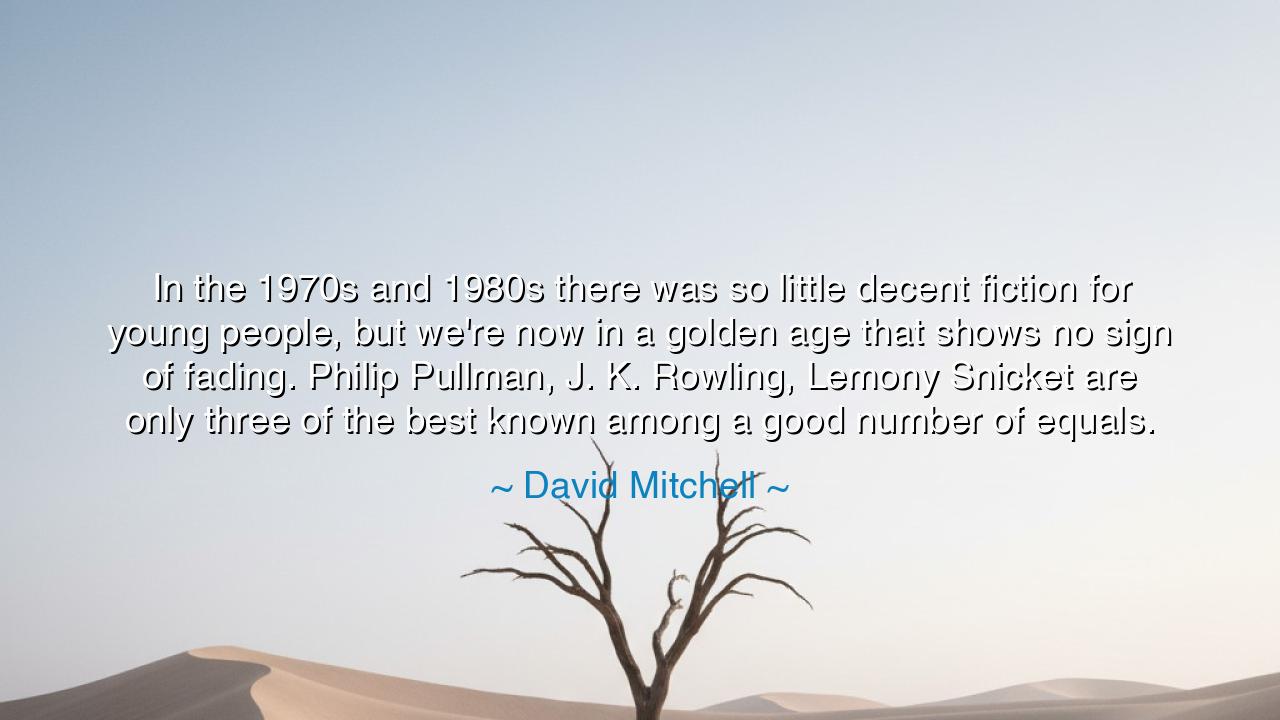
In the 1970s and 1980s there was so little decent fiction for
In the 1970s and 1980s there was so little decent fiction for young people, but we're now in a golden age that shows no sign of fading. Philip Pullman, J. K. Rowling, Lemony Snicket are only three of the best known among a good number of equals.






"In the 1970s and 1980s there was so little decent fiction for young people, but we're now in a golden age that shows no sign of fading. Philip Pullman, J. K. Rowling, Lemony Snicket are only three of the best known among a good number of equals." – David Mitchell
In the annals of history, there are moments when the winds of change bring with them not just a new era, but a new kind of wisdom—one that alters the very fabric of human culture. David Mitchell, in his reflection on the evolution of young adult literature, marks such a moment in time. The 1970s and 1980s may have been decades where the voices of young people, their dreams and struggles, were scarcely reflected in literature, but today we find ourselves in the midst of a golden age, where the worlds of fiction for young people are as rich and diverse as the ages themselves. The names of Philip Pullman, J. K. Rowling, and Lemony Snicket now stand as towering beacons of this age, yet they are not alone. Their success marks the rise of a generation of storytellers, whose works have shaped the minds and spirits of countless readers.
Consider the ancient world, where literature was often reserved for the elite and powerful, for those who could afford the scrolls and tutors to read them. Yet, even then, the seeds of change were planted in the stories that emerged from the fringes. Homer’s epics—the Iliad and the Odyssey—were not just stories for the nobility, but for all the people, whether they sat by the fire in a humble hut or in the grand courts of kings. These stories spoke to the common human experience: the search for meaning, for heroism, for love and loss. Just as the ancient bards wove stories for all to hear, today’s young adult authors craft tales for young minds to explore their own worlds, their own challenges, and their own sense of self.
In the 20th century, however, the literary landscape for young readers was barren in comparison to the vibrant tales of old. The 1970s and 1980s were decades marked by a lack of representation, where the stories aimed at young people often fell short of capturing the breadth of human experience. Yet, as Mitchell points out, today we stand in the midst of a renaissance—a time when the world of young adult literature has exploded in richness and variety. The golden age he speaks of is not just about the success of individual authors, but about the shift in culture that has made room for new voices, new perspectives, and new ways of telling stories. Fantasy, adventure, and coming-of-age narratives now thrive, offering young readers a tapestry of possibilities.
Look at the legacy of J. K. Rowling, whose world of Harry Potter transformed the landscape of young adult fiction. Her books not only ignited the imaginations of millions but also captured the complexities of growing up, of facing fears, and of discovering one’s true self. Rowling’s work became a global phenomenon, inspiring generations of young readers to embrace the world of books. In the same vein, Philip Pullman’s His Dark Materials series brought forth a new narrative—a world of intellectual depth, moral quandaries, and the struggle for freedom—that spoke to both young and adult readers alike. These works, and others like them, have become milestones in the journey of young adult literature, much like the tales of Hercules or the Aeneid once were for the youth of the ancient world.
Even the character of Lemony Snicket, in his darkly whimsical world, has left an indelible mark on the literary canon. His stories may carry a veil of mystery, but they are also filled with lessons of perseverance, loyalty, and the pursuit of justice, even in the face of adversity. In this sense, he is akin to the heroes and tragic figures of the classical myths—characters who endure suffering, yet emerge stronger and wiser, offering young readers a mirror through which they can examine their own struggles. The power of literature, then, is not simply to entertain, but to transform—to shape minds and inspire action.
The lesson we can draw from this golden age of literature is clear: stories have the power to shape generations. They offer more than just escape; they provide the tools for understanding the world and ourselves. As parents, educators, and readers, we must celebrate the wealth of stories available to young people today, recognizing that in these pages lie the seeds of empathy, resilience, and wisdom. Just as the great epics of the past shaped the worldviews of those who read them, so too can the stories of today shape the future of those who encounter them.
In practical terms, we must encourage young people to immerse themselves in the stories that speak to their own lives, while also challenging them to explore worlds beyond their own. Let us remember that each story, whether told in the pages of a book or through the spoken word, carries the potential to transform minds and hearts. The golden age of young adult literature is not simply a reflection of literary success, but a testament to the enduring power of storytelling—a power that, in the hands of both writer and reader, shapes the very fabric of our future.






AAdministratorAdministrator
Welcome, honored guests. Please leave a comment, we will respond soon